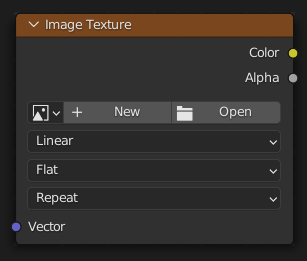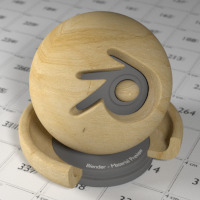Nœud Image Texture

The Image Texture is used to add an image file as a texture.
Inputs
- Vecteur
Texture coordinate for texture look-up. If this socket is left unconnected, UV coordinates from the active UV render layer are used.
Properties
- Image
Image data-block used as the image source. More settings can be found in : These include options to control the alpha channel along with addition options for the color space. These addition options are documented with the rest of Common Image Settings.
- Interpolation
Méthode de mise à l’échelle des images vers le haut ou vers le bas pour le rendu.
- Linear
Interpolation de qualité normale.
- Cubic
Interpolation plus fluide et de meilleure qualité. Pour les bump maps, cela doit être utilisé pour obtenir les meilleurs résultats.
- Closest
Pas d’interpolation, utilise uniquement le pixel le plus proche pour le rendu du pixel art.
- Smart
Cycles Only Only for Open Shading Language. Use cubic interpolation when scaling up and linear when scaling down, for a better performance and sharpness.
- Projection
Projection to use for mapping the textures.
- Flat
Uses the XY coordinates for mapping.
- Box
Maps the image to the six sides of a virtual box, based on the normal, using XY, YZ and XZ coordinates depending on the side.
- Blend
For Box mapping, the amount to blend between sides of the box, to get rid of sharp transitions between the different sides. Blending is useful to map a procedural-like image texture pattern seamlessly on a model. 0.0 gives no blending; higher values give a smoother transition.
- Sphere
Sphere mapping is the best type for mapping a sphere, and it is perfect for making planets and similar objects. It is often very useful for creating organic objects.
- Tube
Maps the texture around an object like a label on a bottle. The texture is therefore more stretched on the cylinder. This mapping is of course very good for making the label on a bottle, or assigning stickers to rounded objects. However, this is not a cylindrical mapping so the ends of the cylinder are undefined.
- Extension
L’extension définit comment l’image est extrapolée au-delà des limites d’origine :
- Repeat
Répétera l’image horizontalement et verticalement, donnant un résultaten mosaïque.
- Extend
Étendra l’image en répétant les pixels sur ses bords.
- Clip
Coupe à la taille d’origine de l’image et définit toutes les valeurs de pixels extérieurs sur un noir transparent.
- Color Space
Type de données contenues dans l’image, des données de Couleur ou . Pour la plupart des textures de couleur devrait être utilisé, mais dans le cas de par ex. ou une map alpha, les valeurs de pixel devraient être interprétées comme des données , pour éviter de faire des conversions d’espace de couleurs indésirables.
La liste des espaces colorimétriques dépend de la OCIO config active. Les espaces colorimétriques pris en charge par défaut sont décrits en détail ici : Default OpenColorIO Configuration
- Alpha
If the source file has an Alpha (transparency) channel, you can choose how the alpha channel is encoded in the image.
Outputs
- Color
RGB color from image. If the image has alpha, the color is premultiplied with alpha if the Alpha output is used, and unpremultiplied or straight if the Alpha output is not used.
- Alpha
Canal alpha de l’image.
Exemples

Texture d’image de GoodTextures.com.